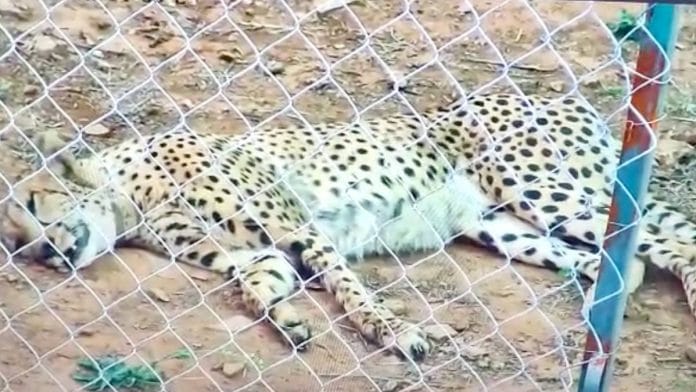New Delhi: One of the 12 cheetahs translocated from South Africa to the Kuno National Park in Madhya Pradesh earlier this year died suddenly Sunday afternoon, forest officials told ThePrint. The death of Uday — as the cheetah had been recently christened — brings the death toll of cheetahs in India in recent months to two, after a Namibian cheetah, Sasha, died of kidney disease in March.
Video footage from the national park seen by ThePrint shows the cheetah swaying and unable to walk, before collapsing on the ground and panting. Uday died on Sunday afternoon when he was rushed for treatment, after authorities realized he was ailing.
“The animal was perfectly normal until yesterday [Saturday]. Today [Sunday] when the veterinarians went to check on him he appeared low on energy and sick, and he was lying down. We decided to take him to the quarantine enclosure for treatment, but he died in the process,” said J.S. Chauhan, chief wildlife warden.
A team of five veterinarians from Jabalpur and Bhopal has been rushed to Kuno, and is expected to conduct a post-mortem Monday to ascertain the cause of death.
Twelve cheetahs from South Africa were translocated to India on 18 February this year, after a delay of many months. They joined eight others from Namibia that had been brought to the country in September 2022.
The cheetah translocation project is the biggest conservation experiment of its kind, and its progress is being watched closely by experts from across the world.
While the Namibian cheetahs are slowly being transitioned into the wild, the South African cheetahs have been shifted to larger fenced enclosures in order to acclimatise, before they are released into the wild. The South African cheetahs had been in mandatory quarantine for over one month in India. Uday died after being shifted back to the quarantine enclosure from the larger fenced one.
The total number of cheetahs in the country now stands at 22, after one of the cheetahs gave birth to four cubs last month. The surviving cheetahs are healthy, according to Chauhan.
Also read: ‘Threat to wildlife ignored’ — Maharashtra blackbucks death puts spotlight on roadkill mitigation
‘Losing fitness in quarantine’
The South African cheetahs have spent over 10 months in fenced enclosures. ThePrint had reported in December last year that experts were concerned about how the unusually long quarantine period would affect the animals’ fitness levels.
A bulk of this quarantine period was spent in South Africa, where there were delays in signing translocation agreement.
“We won’t know what the cause of death was until we get the blood test results, but these cheetahs are wild and have now spent over eight per cent of their lives in quarantine. That can’t be healthy,” Vincent Van Der Merwe, an expert with the Cheetah Metapopulation Project, which facilitated the translocation from South Africa, told ThePrint.
He added: “They were losing fitness during their time in quarantine, on account of the long wait by the South African government. Losing fitness, getting stressed, incorrect food in Kuno and incorrect feeding regime may have had a role to play.”
Uday’s age is unknown, but the hair on his belly indicates he’s older [as compared to the other], claimed Van Der Merwe. According to biodata from the Cheetah Metapopulation Project, Uday was a free-roaming wild cheetah from the Waterberg region of South Africa, and was described as being “extremely skittish”.
South African veterinarian Dr. Mike Toft certified the animal’s health was in “excellent” condition at the time of the translocation, in a document dated 13 February. ThePrint has seen the document.
“I agree that there have been changes to their natural diet. In Africa the cheetahs were being fed all kinds of wild animals, but over here, we can’t do that so we have been feeding them water buffalo for the past seven months,” Chauhan said, adding, “If it was the diet, my sense is that the illness would not have been so sudden, but we will only know the cause after the post-mortem is done.”
The translocation of the cheetahs has drawn considerable controversy, with conservationists opposing the costs and risks involved in the vision of “re-establishing” a species that went extinct in India in 1952.
Experts from South Africa, Namibia, Wildlife Institute of India, National Tiger Conservation Authority, and the Madhya Pradesh Forest Department are involved in the project.
“We are taking advice and guidance from the African experts. We have been managing the cheetahs for seven months now, and are doing our best,” Chauhan said.
(Edited by Poulomi Banerjee)
Also read: Sampling DNA from air could help track animals, transform wildlife monitoring






